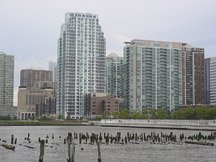For the second year in a row Jersey City has announced that it will not hold its annual Fourth of July fireworks celebration in Liberty State Park, in an effort to save money.
While some residents may be disappointed, most will probably still head to the waterfront to watch the annual Macy’s fireworks in the Hudson River.
Thousands have viewed the show from along the waterfront walkway that runs past that city’s luxury condo developments, like Avalon Cove and Crystal Point.
The NJDEP has the authority to override limitations on public access.
____________
But under a proposal under consideration by the administration of Gov. Christopher Christie, municipalities could restrict public access to thousands of walkways, beaches, and shoreline areas.
According to federal standards adopted in the early 1970s, the state law requires that public access to the waterway be retained in one of two ways. The developer can choose to allow the public to have access to the waterway adjacent to the development – as is the case throughout much of Hudson County – or the developer can pay money into a fund that allows the municipality to build a public waterfront park or walkway someplace else. Money from such funds was spent to build a public waterfront walkway in Secaucus and a water side park in Newark.
But under proposed changes being considered by the state DEP, waterfront access would be guided not by federal standards, but by laws in each town. This would give individual cities and towns the right to restrict access to their waterfront areas as they see fit. Opponents fear the proposed changes could lead some cities to restrict their shores to “residents only” or otherwise restrict public access.
Currently, the DEP has the authority to override and bar such limitations on public access. Under the proposed changes the agency would lose this right.
Not just about beaches
“This has largely been framed as a beachfront issue. But it has real relevance for residents of Hudson County,” said New York-New Jersey Baykeeper Staff Attorney Chris Len. “We have actually been working on waterfront access in the urban communities of northern New Jersey. Access requirements are particularly important for urban areas, in Hudson County in particular because it’s one of the most densely populated counties in the state. Urban residents have suffered outsized impacts from environmental pollution.”
“When people hear the term ‘waterfront’ or ‘beachfront,’ they think of the Jersey Shore. They forget that [in northern New Jersey] we have the Hackensack River, the Passaic River, Newark Bay, and obviously the Hudson River,” said Hackensack Riverkeeper Captain Bill Sheehan. “To us, these waterways are like our beaches. But this is an environmental justice issue, to some degree. ”
The genesis of the proposed restrictions, according to Sheehan, started in “south Jersey beach communities that don’t want ‘those people’ coming into their towns using their beaches.”
These communities have also complained about having to provide restroom and parking facilities to the public.
DEP advisor: More access, not less
Raymond Cantor, a Christie advisor who is working with DEP Commissioner Robert Martin on drafting the new rules, disagrees with the assumption that a revision of the current law will mean less public access.
At a recent public hearing in Jersey City on the proposed changes, Cantor stated, “This will give municipalities more leeway to apply public access than before. It will provide more than [what residents] have now.”
Cantor said the state was forced to rewrite the rules after a 2008 appeals court ruled that the state did not have authority over such things as locating parking and restrooms near beaches. He pointed out that any access plans drawn up by municipalities would have to be approved by the state.
Cantor is currently holding a number of public hearings throughout the state to get public comments on the proposed changes.
The next public hearing, scheduled to take place in south Jersey, had not been scheduled as of press time.
E-mail E. Assata Wright at awright@hudsonreporter.com.
